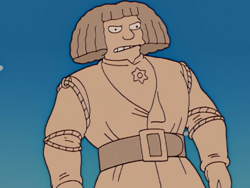
|
The contents of this article or section are considered to be non-canon and therefore may not have actually happened or existed.
|
| Male Golem
|
| Character Information
|
The Male Golem (also known as the Golem of Prague) was a Jewish Golem made of clay.
History
The Golem was created by a Jewish priest in the 17th century to defend the Jewish people against threats and oppression. He did whatever command was written on a scroll and placed into his mouth; one old request was "Kill the Tsar". Eventually, he ended up in the possession of Krusty the Clown.
Bart found the Golem when he was trying to find Krusty to complain about a Krusty alarm clock that spat acid. Krusty told Bart about what the Golem was capable of and how it worked, and Bart placed a note in the Golem's mouth, telling it to come to his house at midnight. It was then that Bart found out the true destructive power of the Golem when it arrived by smashing through a wall. Bart also discovered that poor penmanship affected the Golem's response to commands when he gave it a command to "Kick Homer's balls" and the Golem kicked holes in the walls instead of kicking Homer in the crotch.
Bart used the Golem to take revenge on the school bullies and to kill Principal Skinner. Lisa, however, didn't think the Golem liked killing people and put a scroll saying "Speak" into its mouth. After some growling while it found its voice, the Golem told of how he hated killing people, proving Lisa right.
Marge and Lisa created a Female Golem out of Play-Doh to be the Golem's mate. Lisa put a scroll into the Female Golem's mouth with "Live" written on it. The Female Golem then came to life, and she and the Male Golem got married in a Jewish wedding after bribing off the Springfield Police to ignore the murders the Male Golem had committed.
Behind the Laughter
- The statue itself seems to be canon as it was seen in the Simpsons' loft in "The Color Yellow".
- The Golem bears a very strong resemblance to the Golem of the three silent Golem movies, which were made in Germany and came out in 1915, 1917 and 1920.
Appearances


 THOH – "Treehouse of Horror XVII"
THOH – "Treehouse of Horror XVII"  Episode – "The Color Yellow"
Episode – "The Color Yellow"  Episode – "The Book Job" (picture)
Episode – "The Book Job" (picture)
